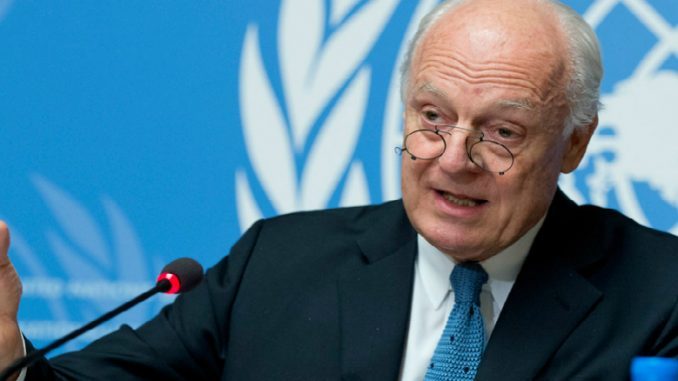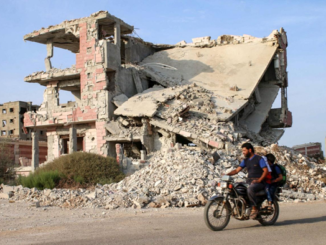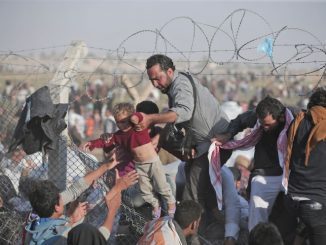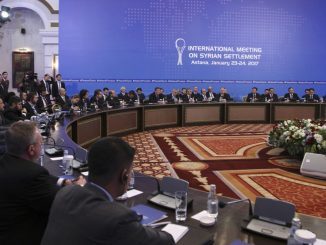
The next rounds of joint talks in Astana and the Syria peace talks in Geneva have been confirmed and the dates were chosen, reflecting a state of commitment towards the political solution despite the tension on ground.
Russia said it has a new plan for Syria peace talks which can be achieved with powers that have a real effect on the Syrian ground after its forces backed Assad regime to achieve many victories against the opposition and tilted the tide of war in his favor.
Russia, Iran, and Turkey said they were ready to help broker a Syria peace deal, and organized peace talks meeting in Kazakhstan on January 23.
The first day of the talks was focused on ways to strengthen the ceasefire. It ended with tension as both parts traded blames over truce breaches. In addition, the opposition refused to have direct negotiations with Assad regime.
The talks have ended with Russia, Turkey, and Iran making a joint statement about the consequences of the talks and agreeing on a mechanism to support a delicate ceasefire and to support a new round of peace talks in Geneva.
The trio meeting
Russian Foreign Minister Sergey Lavrov said after Astana meeting that a tripartite mechanism was established by the three countries to monitor the cease-fire in Syria, and they will meet together two times to discuss it.
They met first at February 6 in Astana and Russia proposed two documents.
The first paper is a protocol to the ceasefire agreement focusing on conditions for the regime of cessation of hostilities as well as the parties’ responsibilities to ensure humanitarian access and to exchange of forcibly held persons. The second one is a statute on the reconciled settlement that is designed to stabilize situation in besieged areas as soon as possible.
“These documents are complicated and, of course, need to be adjusted by both Syrian government and opposition,” head of Russian delegation said.
“The participants of the meeting discussed the progress of implementation of cessation of hostilities in Syria, special measures to establish an effective monitoring mechanism and control … The participants also discussed the measures of mutual confidence and ensuring unimpeded humanitarian access,” he added.
Another meeting was agreed on to discuss further the proposed document and implementing the ceasefire.
The next round of Astana talks will take place on February 15-16, the Russian Foreign Ministry’s spokeswoman Maria Zakharova said on Thursday.
“The preparations are underway, we assume that the meeting in Astana will take place on February 15-16,” Zakharova told a press briefing.
She underlined that the talks in Astana were not considered as “taken out of context of the political settlement in Syria”.
“It is a part of efforts, joint efforts aimed at the settlement of the political crisis,” Zakharova explained.
Syria peace talks in Geneva
The Syria peace talks had been planned to begin in Geneva on Feb. 8 after the Russian-backed talks were made on January 23 in Astana, but they had been postponed.
The UN envoy for Syria, Staffan de Mistura, said in January that he had decided to delay the UN-sponsored talks in order to take advantage of the results of Astana talks.
“We want to give a chance to this Astana initiative to actually implement itself,” de Mistura told reporters outside the Security Council. “If the ceasefire becomes as solid as we hope, that will only help the serious talk to achieve the concrete.”
He later said that it will be on February 20 instead. “I did ask the [UN] Security Council and based also on the discussions I had with the SG [Secretary-General] to postpone the talks until the 20th [of February],” de Mistura stated.
With this delay, he also gave the both parts more time to choose their policy and delegations. “the Syrian government will have an opportunity to engage in serious discussions on the issue and opposition groups, in their turn, will be given a chance to come to the Geneva talks as one unified group,” he added.
“The invitations will go out in the coming days,” UN spokesman Stephane Dujarric told reporters. “We all know that these processes are rather complex, demand a lot of discussion and consultation with various people.”
Russia, who seems interesting in the political process more than Assad regime, said it supports the upcoming Geneva talks.
“We support the proposal of the UN secretary general’s Special Envoy for Syria Mr. de Mistura to resume intra-Syrian negotiations in Geneva under UN auspices on February 20,” Zakharova told reporters.



